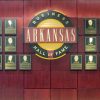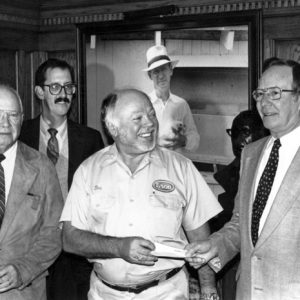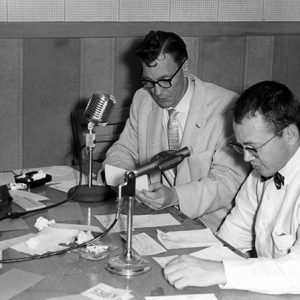calsfoundation@cals.org
Don Tyson (1930–2011)
Donald John Tyson was president and CEO of Tyson Foods. By the close of the twentieth century, along with Walmart Inc. founder Sam Walton, Don Tyson was considered one of the pioneers of modern Arkansas economic history, as well as a giant in the global poultry business. At the time of his death in 2011, he was among the richest people in the world, with a personal net worth of $1 billion.
Don Tyson was born on April 21, 1930, in Olathe, Kansas, to John Tyson, founder of Tyson Foods, Inc., and Mildred Ernst Tyson. His family resettled in northwest Arkansas in 1931, and Tyson grew up in Springdale (Washington and Benton counties). He studied at Kemper Military School in Boonville, Missouri, and attended the University of Arkansas (UA) in Fayetteville (Washington County) but left without attaining a degree in order to join the family trade. In 1952, he married Twilla Jean Womochil; they had five children.
Tyson learned the poultry business firsthand by working with his father at virtually every aspect of the trade, from chicken hatching and catching, to driving trucks to distant markets in Kansas City, Missouri, and Chicago, Illinois. In 1958, Tyson and his father opened the company’s first poultry-processing center, in Springdale, with Tyson acting as plant manager. From this point onward, he would serve a vital role in the growth of Tyson Foods as it developed from a regional player to an international concern.
In 1966, Tyson took a new role, as president of Tyson Foods, and, following his father’s death in an automobile accident the following year, he served as the company’s CEO and chairman until 1991. He subsequently became chairman from 1991 to 1995, and finally, senior chairman, from 1995 until his retirement in 2001. From the mid-1960s through the 1990s, Tyson Foods developed into the world’s largest poultry processor. By 1995, Tyson Foods ranked 110th on the Fortune 500 list, with over $5.2 billion in annual sales. Throughout Tyson’s tenure as CEO, Tyson Foods grew dramatically, expanding its earnings with an array of 6,000 “value-added” products. Eventually, the company supplied schools, prisons, and fast-food chains around the globe. Its earliest success came in the late 1950s, with the introduction of Rock Cornish hens. However, the firm’s greatest achievement was to establish ties to McDonald’s, for which it supplied the enormously profitable Chicken McNuggets.
Tyson left an indelible stamp on his company’s culture, from its mandatory uniforms for executives (with a name tag stitched into the shirts) to his steadfast motto, “grow or die,” a philosophy that led to several important acquisitions in the 1970s and 1980s, including the controversial and hotly contested purchase of Holly Farms for $1.5 billion in 1989. This deal made Tyson Foods the number-one poultry producer in America. It also paralleled Don Tyson’s increasing visibility in politics. The election of former Arkansas governor Bill Clinton to the presidency in 1992 drew considerable attention to Tyson’s political contributions as well as his business practices. Most notably, Tyson was accused of providing illegal gifts, such as football tickets and airplane travel, to Clinton’s secretary of agriculture, Mike Espy, at the same time his company faced the possibility of tougher federal food safety inspection standards. In 1997, Tyson Foods pleaded guilty to making $12,000 in illegal gifts and paid a $6 million fine. Later in the 1990s, Tyson Foods faced accusations that it polluted waterways and engaged in efforts to smuggle undocumented migrants into the United States to work in Tyson plants. While Don Tyson was not personally implicated in these scandals, such incidents cast a shadow on an otherwise outstanding career in the poultry trade.
After retiring in 2001, Tyson settled in Fayetteville, where he focused on charitable activities and served as a consultant to Tyson Foods and as a member of the company’s board of directors. After a long battle with cancer, Tyson died on January 6, 2011, at his home in Fayetteville. At the time of his death, Tyson Foods remained the world’s largest meat producer, with annual revenues in excess of $25 billion and more than 100,000 employees working in more than 300 company facilities.
For additional information:
Riffel, Brent. “The Feathered Kingdom: Tyson Foods and the Transformation of American Land, Labor, and Law, 1930–2005.” PhD diss., University of Arkansas, 2008.
———. “The Nuevo South: Tyson Foods and the Transformation of American Labor.” Southern Historian 29 (Spring 2008): 21–35.
Schwartz, Marvin. Tyson: From Farm to Market. Fayetteville: University of Arkansas Press, 1991.
Strausberg, Stephen. From Hills and Hollers: The Rise of the Poultry Industry in Arkansas. Fayetteville: Arkansas Agricultural Experiment Station, 1995.
Striffler, Steve. Chicken: The Dangerous Transformation of America’s Favorite Food. New Haven, CT: Yale University Press, 2005.
Brent E. Riffel
College of the Canyons









Comments
No comments on this entry yet.